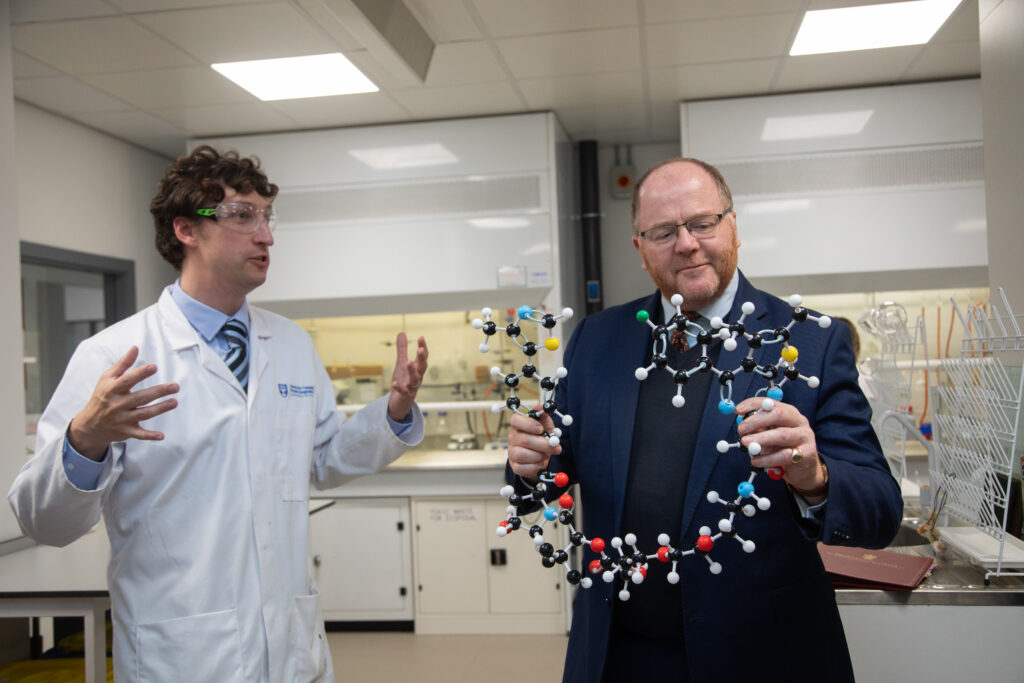A UNIVERSITY of Dundee research centre working in drug discovery has been officially opened by the UK’s Science Minister.
George Freeman MP visited the University’s Centre for Targeted Protein Degradation (CeTPD) on Thursday, a multi-million-pound facility part of its School of Life Sciences.
Minister Freeman met with the academic leaders behind the research, which has been pioneered at Dundee to learn more about Targeted Protein Degradation (TPD)
TPD is transforming modern research and development, providing the scientific community with the hope of treating diseases previously thought to be undruggable.

Professor Iain Gillespie, Principal and Vice-Chancellor at the University, said: “It is a pleasure to welcome the Minister to open our new Centre for Targeted Protein Degradation.
“The University is recognised globally in the field of life sciences and this new Centre represents our commitment to further enhancing this reputation.
“It is fitting that the CeTPD is located next to the Tay Cities Regional Innovation Hub, which has been funded via the Tay Cities Region Deal.
“These sites bring together world-class research and entrepreneurial expertise that will advance and commercialise the breakthroughs being made here.
“Translating our research into successful spinout companies will only help to further establish Dundee, Scotland, and the wider UK at the centre of the highly competitive life sciences sector.”
TPD is a relatively new field within drug discovery, where proteins in the cell that lead to disease are targeted for removal, or degradation, using molecules called degraders.
These degrader molecules are now utilised around the world to develop new treatments for illnesses such as cancer, as well as dermatological and neurological conditions.
TPD research has attracted billions of pounds of investment globally in recent years, with Dundee widely recognised as a world leader in the field.
The new building allows the University to create a new unit, that will be expected to more than double in size over the next five years, bringing more high-skilled jobs to the area.
It was established with support from industry partners and philanthropic organisations including the Sir Jules Thorn Charitable Trust and the Northwood Charitable Trust.
The CeTPD will also support new spinout companies, where exceptional fundamental research is translated into commercial products that can benefit patients across the world.
Companies such as Amphista Therapeutics are already utilising TPD to create first-in-class therapeutics.
Professor Alessio Ciulli from the University’s School of Life Sciences is a leading figure in developing insights into Targeted Protein Degradation.
He said: “Targeted Protein Degradation is one of the most exciting areas of science today.”
“Dundee is front and centre of global efforts in this new field.
“We are one of a handful of institutions leading the world in TPD.
“Our new Centre enables us to take our science to the next level and offers a pinnacle for training and innovation in TPD research.
“Welcoming the Minister to Dundee has been a huge honour for us all and allowed us to demonstrate the significant scientific and economic impact our work has.
“The establishment of CeTPD is a milestone moment and will ensure that research carried out here in Dundee is at the vanguard of drug discovery for years to come.”
George Freeman MP said: “It is a joy for me to be here to signal that in Scotland, something very special is happening.
“This is not just a great UK story but a brilliant Dundee story.
“There are children born here who will think of Dundee as a city of technology, a city of science, and as a place creating innovations and opportunities for them.
“It gives a new generation a sense that we can cure disease, improve the world, and make Scotland and the United Kingdom safer and more prosperous.”

